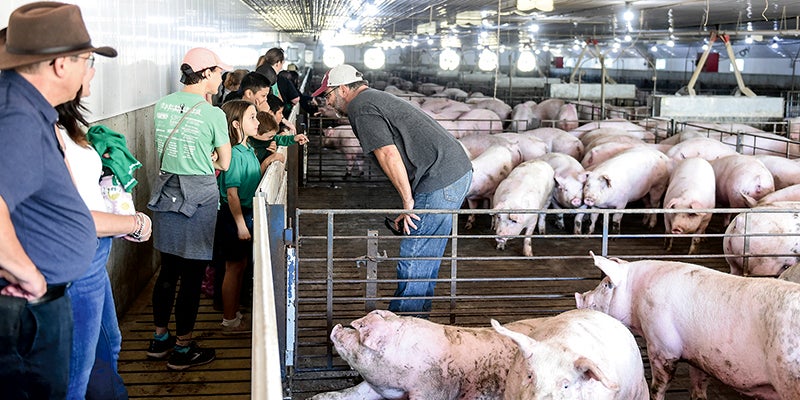Same land, fresh ideas
Published 12:38 pm Wednesday, March 7, 2012

While the skies above the Nelson farm, southeast of Lyle, changes little over the years, the same can't be said for the farming industry itself, as changes force farmers to make both subtle and major adjustments to how they approach agriculture.
Family farms change with the times
This story originally appeared in Progress 2012, which published Sunday, Feb. 26.
A drive by most area farms doesn’t often reveal much change from previous decades.

Joel and his dad, Roger, have farmed the same land for more than 60 years and have seen plenty of changes.
Take Roger Nelson and his son, Joel Nelson, of Lyle for example. Their farm has operated in the same area for more than 60 years. Near their farm and in the surrounding counties, old barns, grain bins, row crops and livestock pastures remain. Farmers still drive old tractors, and they mostly do the same physical labor each day that they did years ago.
But like many, the Nelsons’ farm operation has gone through both subtle and major changes.
Roger recalls milking cows, feeding hogs and raising chickens when his father and grandfather moved to the farm in 1949. But since the late 50s, Roger has been strictly a row crop farmer. That’s the only farming Joel has ever done; the economy changed the way farmers operate.
“It reached a point in the late 50s where people were starting to specialize,” Roger said. “They wanted to have the largest dairy operations or the largest hog operations. It was either get bigger in one area or get out, so we chose to go with just row crop farming.”
But in the past few years, technology has demanded changes at the Nelsons’ farm — changes that can’t be seen from their driveway or in their fields. They still have plenty of acreage, their own storage bins, tractors and barns. But storing grain and hauling it to local elevators has changed. They travel much fewer miles, and they sell their grain for more profit, thanks to Lyle-based Absolute Energy, a 115-million-gallon per year ethanol plant.
“One of the best things that happened to the corn farmer is an ethanol plant located in Lyle, just two miles away from us,” Roger said. “That’s had a big impact on probably a 50-mile radius.”
Instead of selling grain for feed, the Nelsons now sell nearly 99 percent of their corn to Absolute Energy, which they have been partnering with for about four years. The local plant spurred an investment opportunity for the family, as well.
“There was a chance for anyone to invest in that plant when it was built, so we did that,” Roger said. “You can share in the profits of the plant itself, in addition to getting a better price for your crops.”
Along with increased worldwide demand for food, the Nelsons said, Ethanol has been one of the biggest changes they’ve seen in the agriculture industry. More than row crop farmers have benefited.
“When you have another entity like that demanding corn, it helps the market,” Joel said.
Roger and Joel said where their basis levels between local prices and prices at the Chicago Board of Trade used to fluctuate from 30 to 50 cents at a given time, that number has fallen to the 15- to 30-cents range. And once their corn has made its way into ethanol, it leaves behind a byproduct, which is helping around the world.
“The brick nations — Brazil, Russia, India and China — as they developed, their demand for food has gone crazy. China especially,” Joel said. “Some of that stuff that’s come out of Lyle has been stuck on a barge and shipped to China.”
While ethanol has forced major changes in the economy and how the Nelsons sell their crops, technology is creeping its way into the Nelson farm in the form of minor upgrades, too.
Since nearly 2003, Joel has been using an auto-steer system in his tractor, which allows him to till, apply fertilizer and plant rows to within sub-inch accuracy. While the driver must still be present, the system steers a tractor for the length of a field until the farmer must turn the machine. That has reduced Roger and Joel’s fatigue on those 12- to 15-hour days in the fields.
“Now you can read the Austin Daily Herald while you’re going across the field,” Roger joked.
While not all farmers have auto-steer systems, nearly all of them have tile in their fields, something the Nelsons have upgraded to in the past years. Where many fields had parallel tile lines running 100 feet apart, farmers have come back and stuck tile in between those.
“As the grain prices got higher, you wanted to maximize your yield,” Roger said. “And some areas that maybe needed drainage didn’t have it, so they were pretty near average yield. But you get it all tiled, and it will yield pretty evenly across the field.”
Still, farming has become more expensive.
“With increased price and demand in the last few years, just the gross dollars it takes to run the operation has really gone up,” Joel said.
That’s something with which every farmer is dealing. However, that hasn’t caused operations to collapse in the immediate area. Roger and Joel don’t see lands changing hands or farms folding, and they aim to keep going strong. Regardless of their situation, they have a lot of pride.
“There’s something about farming that I feel … you get to experience the sense of accomplishment several times a year,” Roger said. “Which, to me, is a lot more rewarding than working 50 weeks for a two-week vacation.”
Roger has seen the family farm come a long way from when he started, when he and his father were still using horse-drawn power and a threshing machine. Within the next 20 years, perhaps another generation will be farming the Nelson acres: one or all of Joel and his wife’s three children.





